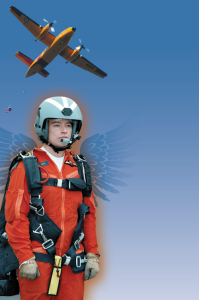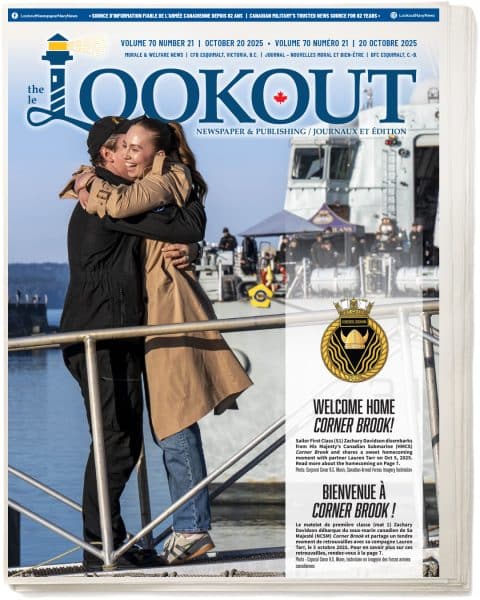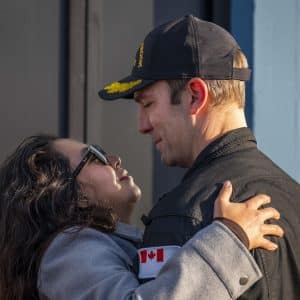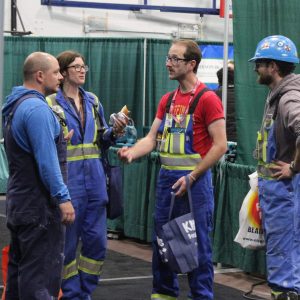
Warrant Officer Tammy Negraeff.
Never utter the words “it can’t be done” to Warrant Officer Tammy Negraeff.
Whenever Canada’s first-ever female Search and Rescue Technician (SAR tech) hears this, an unwavering feeling of determination to disprove the doubters overtakes her.
A month ago, her 25-year military career ended with a retirement party, and a moment of reflection on breaking a barrier for women.
“I wanted to be a SAR Tech no matter what, whether I was the first female didn’t matter at all to me,” says WO Negraeff. “But the fact that it set a trailblazing precedent is super.”
Her career began in 1988 while fighting forest fires in Nelson, B.C., as a student employee with Ministry of Forests Lands and Natural Resource Operations. Rumour of a recruiting officer coming to town drifted to her ears.
She immediately signed up for a meeting.
The recruiter, having never encountered a woman in the SAR trade, doubted her capability.
“He was a little old school,” she says.
“The recruiter looked at me and had a smirk on his face while remarking he didn’t think I understood what I was getting into.”
Two years later she pledged her service to Canada.
Seven years after that she was selected to attend a SAR Tech training course at CFB Comox.
The learning curve was sharp and the physical and psychological testing “highly challenging” she recalls.
From a pool of approximately 30 applicants each year only about 10 to 15 make the grade.
A determined Negraeff would eventually prove the recruiting officer wrong, breaking the SAR Tech gender barrier in 1998 when she graduated as a Master Corporal.
“She instantly fit right in,” says Negraeff’s search and rescue partner WO Lance Teichrib.
“She didn’t expect to be treated differently and excelled in her training.”
Real life SAR Tech work began fairly quickly after graduation.
It was a cold mid-winter day when she and WO Teichrib were deployed to locate two occupants of a small plane that had crashed near Lillooet, B.C., a remote town 130 km northwest of Whistler.
The pilot had strayed way off course and as he tried to steer his Cessna up and out of a steep valley, the plane pancaked nose down.
The two men survived the crash, but things got worse when they attempted an unsuccessful hike out of the valley that was covered in a waist-high blanket of snow.
The pair lacked basic winter clothing and was wearing street shoes; WO Negraeff says hypothermia quickly set in.
From high above in their Buffalo fixed wing aircraft, WO Negraeff and WO Teichrib spotted the downed plane along with the footprints in the snow leading away from it.
They parachuted to the valley floor, put on snowshoes and followed the footprints to eventually locate and rescue the men.
“I’ll never forget their words when they said to us ‘you guys looked like angels flying out of the sky’,” says WO Negraeff.
While she says some have even gone so far as to call them “angels in orange jump suits”, more often a SAR tech’s jump is less glamorous, and often becomes a body-recovery mission.
The only satisfaction in this grim task, she says, is “being able to close the loop” for grieving family members.
When her work became unpleasant, perilous or dangerous, WO Negraeff says the words of former United States first lady Eleanor Roosevelt have always been inspirational to her.
“For me I have always valued Roosevelt’s famous saying ‘Nobody can make you feel inferior without your own consent’ to get me through those tough times.”
She was able to successfully master the adversity that goes along with the job, and by 2006 when she was posted at Cold Lake, AB, things would come full circle.
She was promoted to Sergeant and learned that she would be returning to CFB Comox, but this time as a flight instructor.
In 2011 she would move on to become Warrant Officer at the Regional Cadet Support Unit, marking the last chapter in her Royal Canadian Air Force career.
Retirement from the workforce is not yet on her radar.
She is now busy tackling her next career as Emergency Coordinator for the Richmond, B.C. Hospital for Health Emergency Management.
Peter Mallett
Staff Writer









